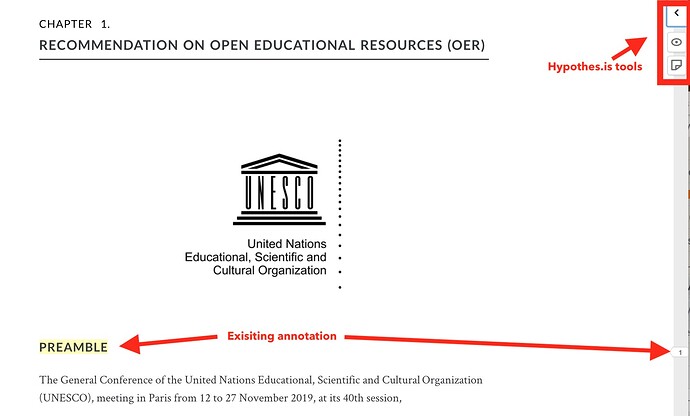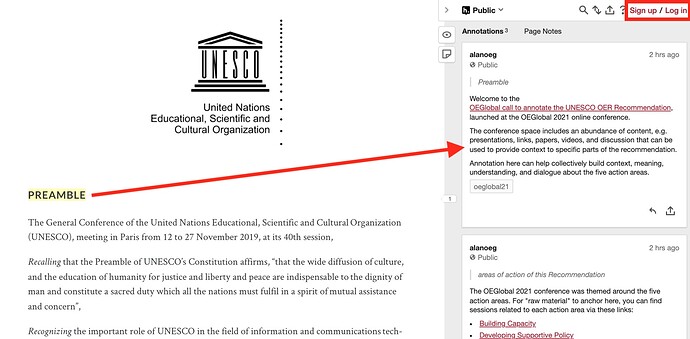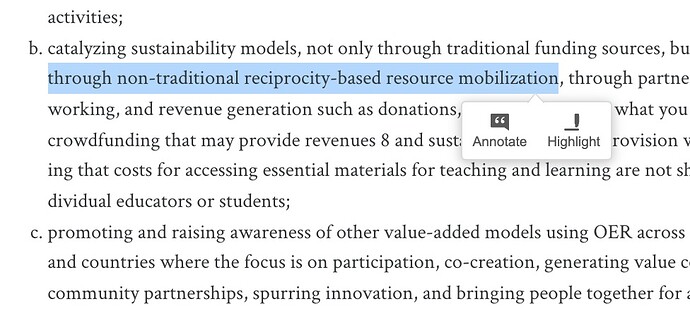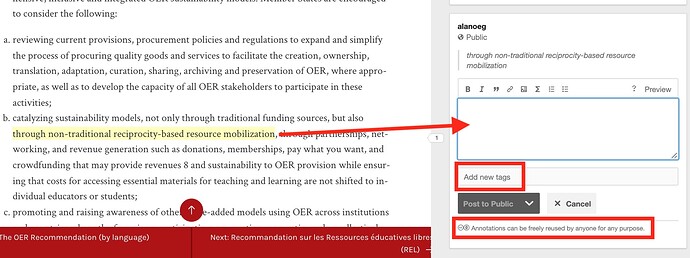UNESCO OER Recommendation Annotation Activity
This annotation activity engages the global open education community in becoming familiar with the UNESCO Recommendation on OER, and enrich it by adding annotations related to each of the five action areas of the Recommendation. It provides everyone with an opportunity to position their own open education work within the context of the Recommendation and to learn from the work of others. Annotations supplement the UNESCO OER Recommendation with practical advice from the field adding valuable lessons learned and insights.
This effort has been made possible with our partners Pressbooks and Hypothesis.
The process of annotation will create a focused, curated dialogue around the Recommendation and build community as annotators publish, read, and comment on each other’s annotations. Ultimately, the annotation activity aims to engage the entire global open education community in helping each other implement and advance the UNESCO OER Recommendation.
Authors of annotations highlight and link their annotation to relevant text in the Recommendation.
Practical annotations are invited to identify:
- Models, frameworks and other strategies that support adoption and use of OER
- Existing OER resources, policies, practices, and pedagogies
- Tools, technologies, and infrastructure that supports OER development, distribution, and stewardship
- Research and reports on open education impacts
- Communities and professional development related to OER
- Global organizations that support adoption and implementation of OER
- Sessions that took place during the OEGlobal online conference (and other open education conferences)
Commentary and analysis annotations are invited to:
- Identify needs associated with implementing the Recommendation
- Describe challenges and how to overcome them
- Summarize state of the art in a particular part of the world
- Explore the ways in which implementation of OER differs around the world
- Unpack OER for K-12 vs OER for higher education or lifelong learning
- Suggest new ideas and approaches not documented in the Recommendation
We are making all six language versions of the UNESCO OER Recommendation (openly licensed CC-BY as per UNESCO’s open access policy) available in a Pressbooks site. While we could have annotated directly on the UNESCO official version (where all versions are within a single PDF), we felt it was more manageable to separate them. But more importantly, in the Pressbooks format, we can make the annotation tools directly available rather than relying on using browser extension tools.
Hypothes.is is a free, open-source social annotation technology regularly used by educators. It adds an annotation layer to any public web page or document. To participate in social annotation conversations, start by creating a free Hypothesis account.
All you need to start annotating is to use or create a free account on Hypothesis. The entire Hypothesis sign-up process will take less than one minute. In fact, you will be able to log in or create an account directly in the Pressbooks version.
Also, please note that Hypothesis is not a social network and does not collect any personally identified information except for an email address. Additionally all public annotations by default are licensed Creative Commons CC0.
For an introduction and practice with Hypothes.is annotation, see this asynchronous interactive activity created for the conference.
Annotate the Recommendation on OER Now!
You can find a preview of our Pressbooks version of the Recommendation on OER ready for annotation at https://oer.pressbooks.pub/oeg2021/
If you are familiar with Hypothes.is you can start in by annotating the language version of your choice :
A Look of the Annotation Process
You know Hypothes.is is enabled if you see in the top right corner a gray button with a < symbol. Also, sections of the page highlighted in yellow indicate the presence of existing annotations by other people as well as the numbers in the right side scrollbar.
Upon opening the tools via the < button you see the annotation tools and read existing notes previously added. If you are not logged in to Hypothes.is, you can do it here and even create an account if you have not done so already.
We added an annotation to the first heading as more of a welcome. You can write replies to existing annotations
And as an example of one small value of this tool is that every annotation you make is available as a unique web address. Open this note in context of the source document,
https://hyp.is/Zn–CCFxEeyQfs_9eFdx0A/oer.pressbooks.pub/oeg2021/chapter/english/
How does one annotate? Just select a phrase or word that you would like to add a commentary, question, a reference, a link to something seen here at the conference. Hypothes.is offers right there a choice to add a note as annotation or to simply highlight for your own reference.
Choosing Annotate opens a small composition window. You can add text, make hyperlinks, even insert image or media.
As an example see the annotation added here that references a presentation at this conference.
We ask that you add tags for annotations done during OEGlobal 2021, using oeglobal21 (and any others that you think will help connect ideas).
Tagging this way can create a dynamic link to all annotations done in response to the OEGlobal 2021 conference
Also you should see that all public annotations are automatically licensed under Creative Commons CC0 (learn more…)
Note as well that as you actively annotate you build up a collection of all your notes across all sources (example) – this is a powerful tool for any researcher!
This conference space has accumulated a huge amount of public knowledge, examples that can help provide insight and meaning to the Recommendation on OER-- now we ask you as conference attendees (and the open education community) to light up this version of it with annotations.
References and Examples
- Social Annotation and an Inclusive Praxis for Open Pedagogy in the College Classroom
- ¿Cómo utilizar la herramienta de anotación web Hypothes.is? (tutorial en Español)
- Now is the Time to Be Brave an annotation activity for a workshop with Rajiv Jhangiani, as a part of his OLC Accelerate 2021 keynote
- AnnotatED Workshop on Social Annotation: Instructor Presence and Making Sense of Science
- Annotation in an English Lit class where students studying genres add notes to TED Talks on UN SDGs
- Joining the ‘great conversation’ – The fundamental role of annotation in academic society





